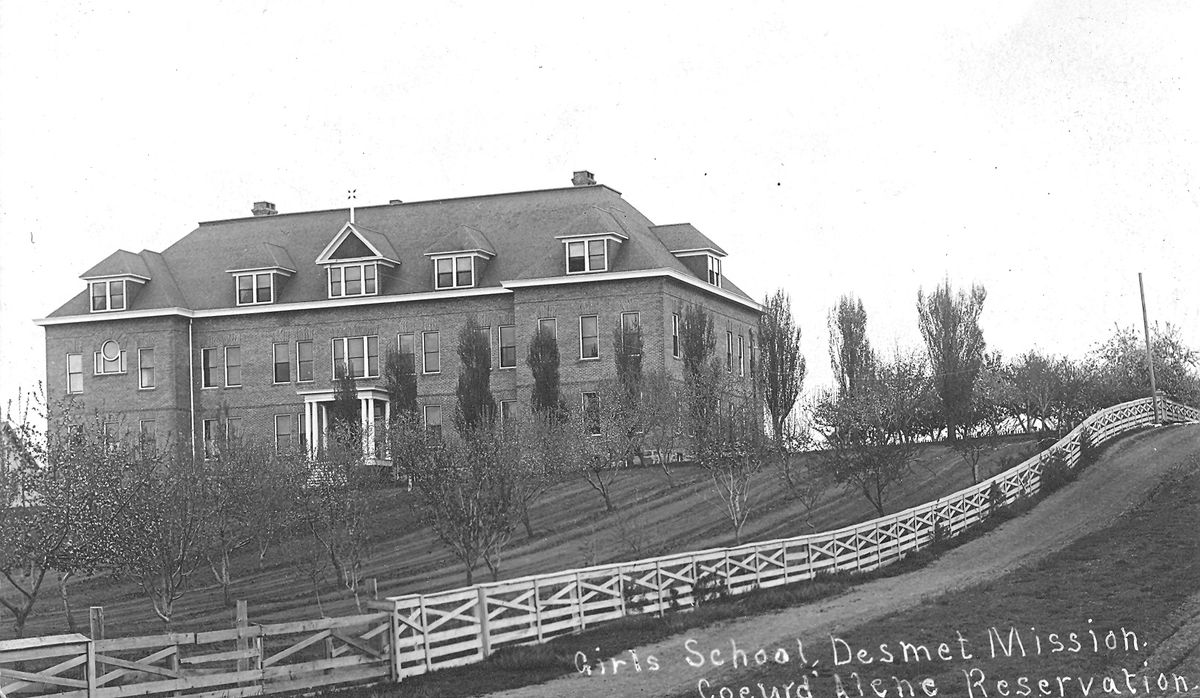Vestal: School fire destroyed big part of tribal member’s past

In the late 1970s, after a stint at secretarial school and a time in Spokane, Mariane Nomee moved home.
For Nomee, that meant DeSmet, Idaho. The Coeur d’Alene Reservation. And the old brick schoolhouse on the hill where she had lived for most of her childhood.
By then, the old Mary Immaculate School was closed and rumored haunted. Haunted by ghosts and perhaps by a legacy as a place where children lived away from their parents and were taught to abandon their culture.
But when Nomee was allowed to move into the abandoned school temporarily with her young family, she was elated.
“I was so happy that I got to go back there,” said Nomee, 68. “A lot of people couldn’t understand why I’d stay in a haunted building. To me it wasn’t haunted. It was my home.”
Nomee’s home burned down early last Friday, and she’s still mourning it. Investigators are still trying to sort out what happened at the school, closed since 1974.
Nomee’s experience is a good reminder that the history of boarding schools for Native Americans represents a fraught chapter in a tragic story – but not a simple one.
The school was built in 1878, after the Sisters of Charity of Providence were invited by Chief Seltice to provide education for the tribe’s girls, said Sister Dolores Ellwart, a tribal member, DeSmet native and former head of the school.
A boarding school for boys had opened around the same time. They were being established on reservations all over the West, run by the government and by church groups. Children lived apart from their families, were taught to read and write English, and were forced to abandon their language and culture – sometimes denigrated and abused.
The best possible light you can cast on this system, the most forgiving view you can take, can’t erase the fact that it was meant to wipe out a culture. To turn “savages” into Christians. Many see it as the well-intentioned flip side of what the cavalry tried to do with guns.
The experience ripples through Native families still: Nomee says that where she recalls an environment of strict discipline, a sister remembers abuse.
“Some people say it was a bad place,” she said. “They hated the school. They hated the nuns. But my experience has always been positive.”
Ellwart said that the issue of those early days is especially sensitive. But it wasn’t a cut-and-dried matter, she said.
“It was a difficult time for the children,” she said, but “that’s what parents wanted, to be able to have their children make a way for themselves because they were being dominated by the white culture.”
Ellwart grew up in DeSmet, attended a boarding school in Spokane, and then joined the Sisters of Providence – returning in 1965 to become principal at Mary Immaculate. By then, it had been turned into a day school for girls and boys; it was closed in 1974, and the tribe opened its own school.
Ellwart, who lives near the church and still serves in the Sacred Heart Mission, said watching the building burn early Feb. 3 brought back a lot of memories.
“As I watched the building go down, I could visualize and remember all the different things that happened in the area that was burning,” she said. “It was kind of like a flashback. It was a shocking time, just to see everything go up in flames.”
The boarding schools operated in DeSmet for decades. Nomee entered as a young first-grader in the late 1940s, at a time when her parents were struggling to feed and clothe a growing family. She said that’s a piece of the history that many people today simply can’t understand: the pervasive influence of poverty.
The school “was a blessing for my family,” she said. “Back in those days, you could go your whole life and want.”
Nomee’s childhood was a busy one. They rose early, shared in the chores, studied in the classrooms and played in the yard, and slept on the third floor. She saw her family sometimes – but sometimes her parents couldn’t afford to visit or break away from the struggles of raising a big family. Nomee was the oldest of 11.
“It was just everyday life,” she said. “We were like one big family, the nuns and the girls.”
She spent eight years at Mary Immaculate School, and later attended boarding schools in Missoula and Cottonwood, Idaho. She went to secretarial school in Portland, worked for a time in Spokane, and then returned to DeSmet.
Her new job brought her face-to-face with the dramatic changes that had been wrought in the education system on the reservation. Nomee was hired as a secretary at the tribal school – a post she held until her retirement.
She knows that her story is only her own. The fire destroyed the building, but the experience remains alive in the memories of the people, for better or for worse.
When she heard about the fire, Nomee told her daughter, “Oh my gosh. That means I’m homeless.
“That’s what it makes me feel like. That was my home.”